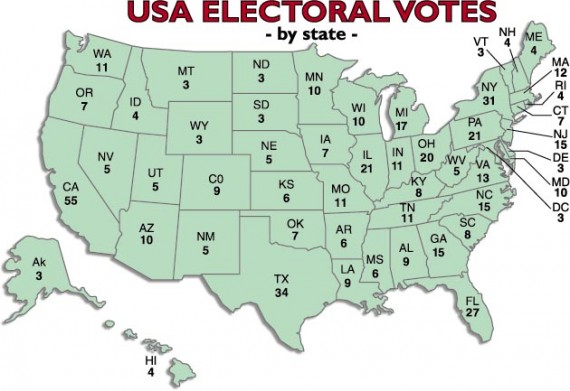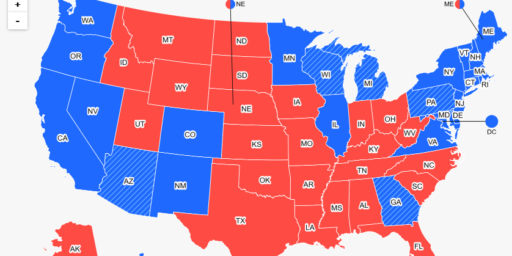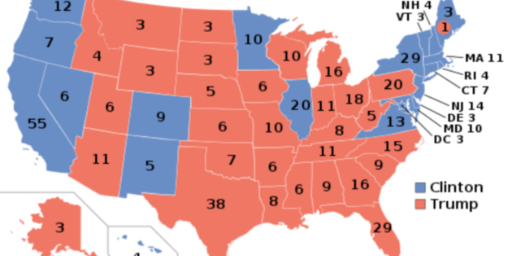Today in “Asked and Answered” (NPV Edition)
How close to success is the National Popular Vote initiative? (Spoiler alert: not close).
 Asked, via Salon: Why doesn’t anyone know we’re incredibly close to replacing the Electoral College with the popular vote?
Asked, via Salon: Why doesn’t anyone know we’re incredibly close to replacing the Electoral College with the popular vote?
Answer: because we aren’t close at all, that’s why.
The article is about the National Popular Vote initiative that is trying to obviate the EC by getting states to pledge that they will give their electoral votes to the candidate who wins the national popular vote. The goal is to create an interstate compact wherein states with 270 or more electoral votes would agree that their method of electoral vote allocation would be linked not to who won a plurality of votes in their state, but rather to the candidate who won the popular vote nationally.
This is all constitutional. Article II, Section 1 clearly gives the states the power to determine how electors are appointed:
Each State shall appoint, in such Manner as the Legislature thereof may direct, a Number of Electors, equal to the whole Number of Senators and Representatives to which the State may be entitled in the Congress: but no Senator or Representative, or Person holding an Office of Trust or Profit under the United States, shall be appointed an Elector.
The notion of an interstate compact derives from clause 3 of the Tenth Amendment:
No State shall, without the Consent of Congress, lay any duty of Tonnage, keep Troops, or Ships of War in time of Peace, enter into any Agreement or Compact with another State, or with a foreign Power, or engage in War, unless actually invaded, or in such imminent Danger as will not admit of delay.
As Ballotpedia notes, these used to be rare, but have become more common:
Unlike today, compacts were quite a rarity in the early years of the nation’s history. Specifically, only 36 compacts were ever approved by the states between 1783 and 1920; those that were accepted dealt almost exclusively with boundary issues with neighboring states. Nowadays, however, there are over 200 such arrangements in existence and each state averages an involvement in 25 interstate compacts.
Now, as a matter of principle, I certainly prefer the NV proposal to our current system. However, the article is overly optimistic about this process. Currently the NPV has been approved by 11 states accounting for 165 EVs. And while it is true that it has passed one chamber in a number of other states, that doesn’t mean anything at all, since in almost all of those cases at least one election has taken place since passage, so the reset button in those states has been pushed. The odds of getting this passed in enough states to guarantee 270 EVs are low, in my opinion.
As such, the Salon headline writers (and the author of the piece) need to take a deep breath:
So far 165 electoral votes from 11 states have been secured. Of the remaining 105 required, 82 are seriously in play, having passed at least one legislative chamber in 10 states. Optimistically, we’re 23 new electoral votes away from ridding ourselves of the Electoral College. It’s something that could be managed through strategically pressuring a handful of state representatives.
Optimistically is not the right word here, delusional is, since really all 105 are still in play. The fact that, for example, the measure passed one chamber in North Carolina in 2007 is not indicative of being on the cusp of success (many of the passages noted here are at least half a decade old). At this point in time, this may be the only way to shift us away from the democracy distorting elements of the EC, but let’s not pretend we are closer than we actually are.
It would be very interesting to see how this would play out if the compact were secured. I am sure there would be court challenges, although ultimately I think the proposal is on solid constitutional ground.






Something that many people don’t seem to understand is that votes are symbols as well as substantive. What a state legislature votes to approve when there’s little likelihood of the measure being approved nationally and what they’ll vote for when it might are two very different things.
@Dave Schuler: Exactly. The closer this gets to reality, the harder it will be to get legislatures to pass it.
Whether it’s constitutional or not is moot. The real problem with the compact is that it would never survive getting activated. Take the most recent election: Hillary won the popular vote, but Trump won the electoral college vote. Well, that means the compact will send the election to Hillary anyways, right?
Well, only if a state in the compact that would normally have gone to Trump forces its electors to vote for Hillary. But even though Hillary won the national popular vote, Trump must have won the popular vote in that particular state.
So the compact means that state level officials in, say, Pennsylvania are, for the two months between election day and the electoral votes being counted in January, going to tell their constituents that even though they clearly preferred Trump, we’re going to deliberately throw the election to Hillary because we care more about the opinion of people outside Pennsylvania than people inside Pennsylvania.
Of course they won’t, that would be career suicide. What’s going to happen is they’re going to immediately bring up legislation to drop out of the compact before January and make sure “the voice of Pennsylvanians matters!”
Counting states where a measure has only passed one branch of the legislature is disingenuous at best. The authors at Salon are, as usual, not very bright.
Another point.
Unless a state has actually changed its law to provide that its electoral votes will go to the winner of the national popular vote regardless of the outcome in their particular state, their agreement to the “compact” should not count at all.
If we’re going to disenfranchise the voters of the state (i.e. your vote doesn’t really count unless it agrees with the majority of the nation) what’s the point in going to the polls and having elections?
I wonder: If we had a popular vote only, what would prevent a litigious grease ball like Trump from refusing to accept the popular vote count (you know, those 3 to 4 million illegal votes) and tying up the final result pending a national recount and review of ballots?
I can’t see any viable way to get rid of the electoral college without a constitutional amendment. I also can’t see any way to elect the President by popular vote without national uniform standards for things like registration, ballot design, vote counting … in other words, States not having any control over or input on the mechanics of Presidential elections. Since it is very unlikely that 38 States are ever going to willingly give up that sort of control, the greatest likelihood is that people will still be arguing 50 or 100 years from now about how flawed electoral college is and why can’t we just get rid of it.
@Todd: Glad to see you’re back.
@Ben Wolf: I still read most of the posts here, but just don’t pop over to the page to comment very often anymore.
@Todd: Well I hope that changes. Your opinions added some much needed diversity.
@Todd: I feel like many of us only comment on occasion. Although I read every article and every comment, most of the time I find that one of the very smart people here has already said what I intended to say – so I simply “upvote”.
I saw this over at Salon yesterday, and my first though was, “What goofy theory have they come up with this time?” It’s just sad.
@Just ‘nutha ig’nint cracker:
Because this votes will also count to determine what is the majority of the nation.
Whay you are saying is like a defender of the Nebraska-Maine system saying “If we’re going to disenfranchise the voters of the district (i.e. your vote doesn’t really count unless it agrees with the majority of the state) what’s the point in going to the polls and having elections?”
If you love the idea of our president being elected by the residents of NYC, Chicago, and coastal California, you’ll love this initiative. But if you prefer our president to be representative of our nation as a whole, then you’ll stick with the wisdom of the Founders and defend the Electoral College.
There’s are reasons why the Framers set up the electoral college system for electing the President, making it about the States, rather than a national popularity contest. Just like they set up the House to be direct election and the Senate to be appointed by the State assemblies. The latter has already been destroyed, to the detriment of the law making system. Doing this with the electoral college would essentially tell most citizens that their votes mean zip.
here in the PNW it’s not even 9 am and I’ve already seen the dumbest thing i’ll see today.
@William Teach: One major problem with appealing to the Founders on this topic is that the EC never functioned as designed in the first place.
The one role the institution did perform was help convince states to ratify the constitution (same with the Senate). That fact, however, tells us nothing about the quality of the institutional choices in question. (Especially a couple of centuries later).
The only way the National Popular Vote is even feasible is to make the Presidential election a completely independent event. Down ballot races actually matter, particularly when certain states have statewide Senate/Governor’s races in Presidential years when others do not. Also, more and more state’s would try to game the system, like California has.
@Gene McLaughlin:
This makes zero sense.
@William Teach:
This also makes zero sense.
The argument for defending the electoral college is that states have their own interests that are somewhat apart from those of the people, and that those differences should be play a role in the selection of the president. (One could also argue that electors provide a mechanism for keeping a bad president out of office, although the most recent college obviously was derelict in its duty to nullify a horrendous result.)
But to argue that the electoral college reflects popular will is such obvious complete horses**t that you should feel embarrassed for saying it.
Obviously, the electoral college does NOT reflect popular will, as it specifically provides a mechanism for rejecting the popular will as it did in 2000 and 2016. It should be obvious that an election that reflects popular will would be determined by a popular vote.
Yet another reason why I can’t take conservatives seriously. A lack of basic comprehension skills must be a requirement for membership.
@Gavrilo:
I presume you’re referring to efforts by California to have at least the same relevance to the presidential primary and campaign season that Iowa, New Hampshire or South Carolina does?
That is clearly worthy of “gaming the system” efforts.
This would be clearly unconstitutional. All it would take is one state to bring suit on the basis that the constitution was violated by a conspiracy of states without amending the constitution and without a vote of Congress to abolish the electoral college. The plaintiff state could show that its citizens were harmed and that the constitution as written no longer applied if this too clever by half scheme was upheld. Not hard for the Supremes to strike down. The founders clearly intended to have the power to elect the President be spread throughout the country and to not give too much weight to major states. The only way to change it is via constitutional amendment.
Although it is presumed constitutional if it were to be enacted you might see a challenge at some point. The states are acting in collusion to subvert a constitutional process that in effect invalidates the votes of the states that did not sign on. There would be equal protection claims and other claims as well. I could see a court saying that the collusion to subvert the constitution is unconstitutional and that they need an amendment to structure their EVs in this way. Talk about a legal mess that would make Bush v. Gore look like child’s play…
Since most of the former issues regarded only boundary issues, it isn’t that hard to imagine that they weren’t that controversial. But this one is, to say the least. Do you really believe that congress will approve of the change?